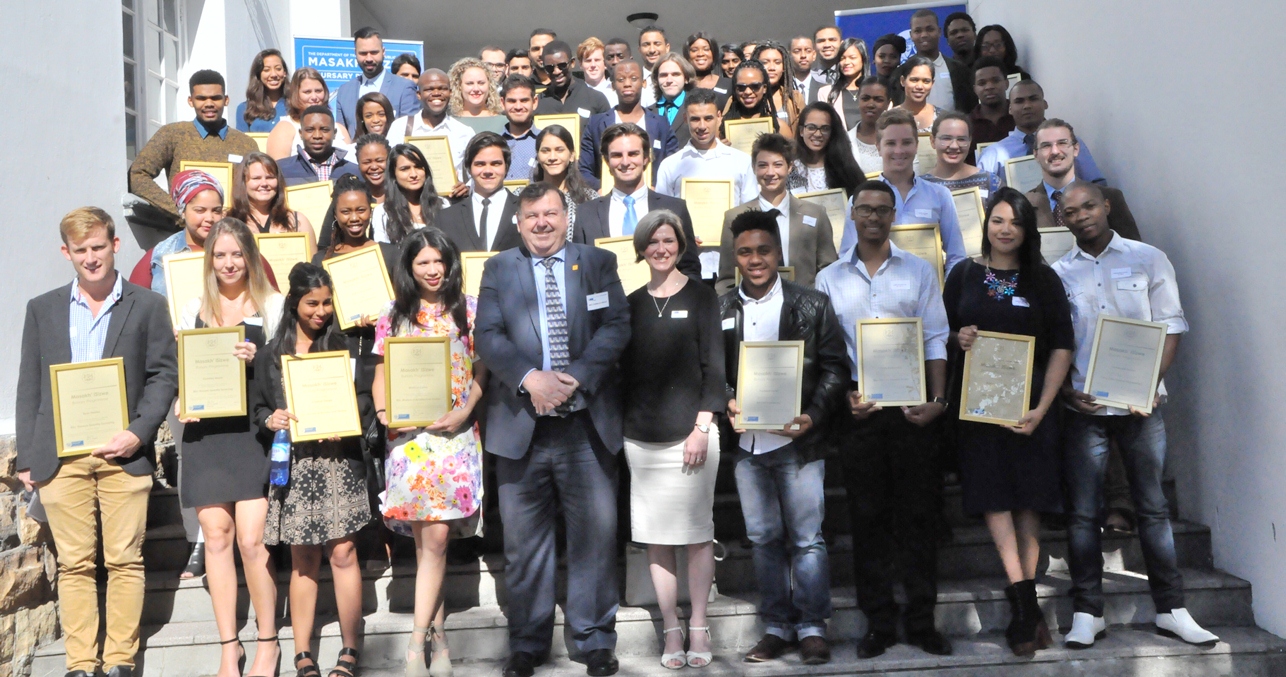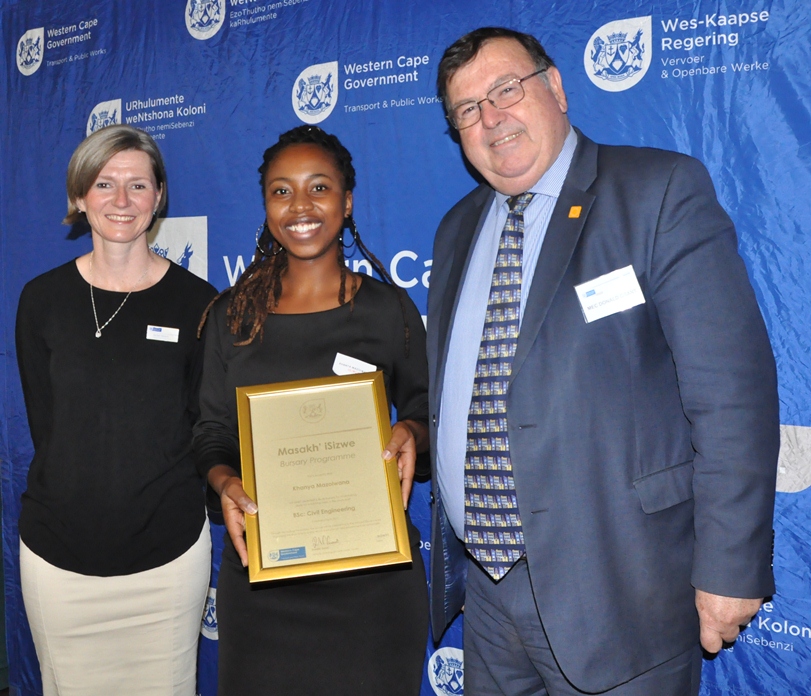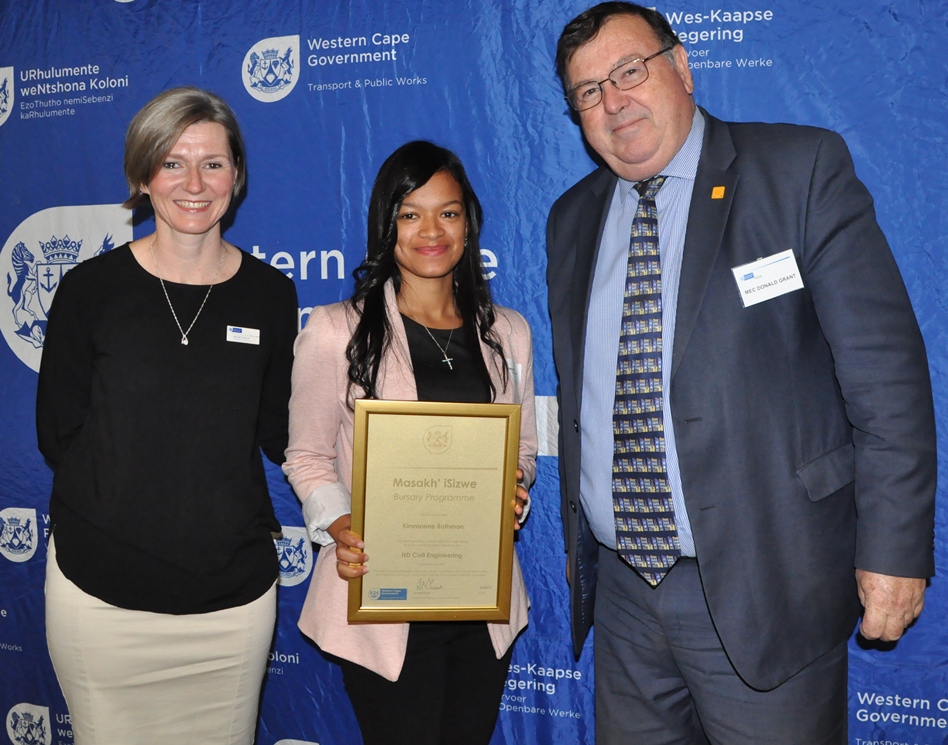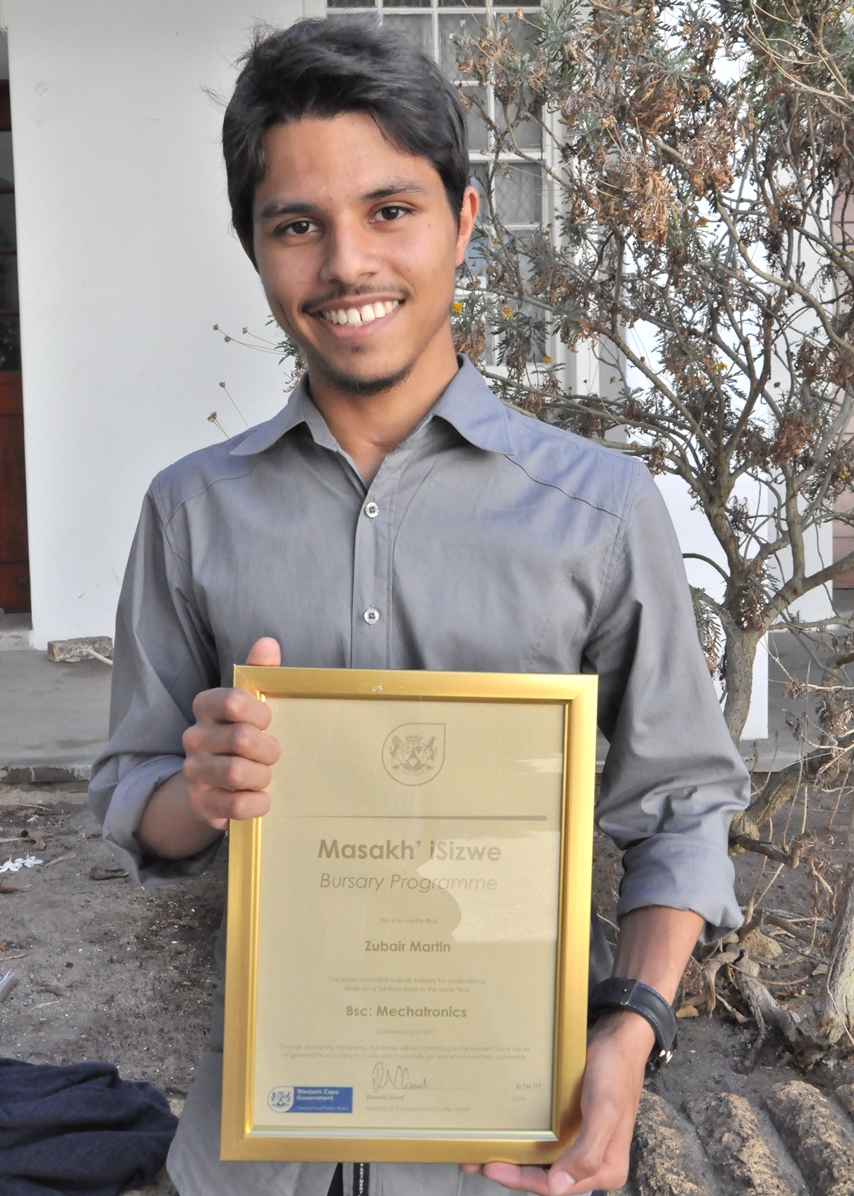
News
Masakh'iSizwe bursaries awarded to 72 university students
Below is an excerpt from the speech delivered by Donald Grant, Minister of Transport and Public Works at the Masakh’iSizwe Bursary Awards Ceremony in Cape Town today, 22 April 2017. Bursaries were awarded to a total of 72 university students in the transport, engineering and built environment fields.
Statement by Donald Grant, Minister of Transport and Public Works
It is an honour for me to address you and to celebrate once again what is a tremendous achievement. We are gathered here to welcome new members of the Department’s Masakh’iSizwe Bursary Programme, and award them bursaries to further their studies. My special thanks to all the parents and guardians in attendance for showing their support for the new bursars. I hope you will all continue to do so as these bursars continue on what will undoubtedly be a challenging journey towards attaining their academic qualifications.
Once they have completed their formal qualifications, graduates must meet a number of requirements before they can become registered professionals. It is with great pleasure that I inform you that my Department has, because of the challenges that may lie ahead, been complementing its bursary programme with two professional development programmes that train and develop graduates employed by the Department, and that give them the support they need to meet the requirements for professional registration. Today, I’m honouring all the people who have become professionals with the Department’s support for all their dedication and hard work. I’m well aware that it is not an easy task to attain professional registration. This is our contribution to increasing the number of people who have met the complex demands for professional registration in the transport, engineering and built environment disciplines.
The current economic climate is particularly difficult for youth. It is a struggle for young people to gain access to tertiary education. Once they have completed their courses, it is often a struggle for young graduates to gain employment. It is a paradox that, while our country is faced with shortage of skills, many graduates remain unemployed. This situation is caused in part by a mismatch in the supply and demand for specific skills, as well as employers requiring experience even for entry-level posts. The Masakh’iSizwe bursary programme and the professional development programmes work together to create an environment that removes barriers for youth, unlocks their potential, and provides them with opportunities to maximise their achievement. At the same time these programmes address critical skills shortages while empowering youth, and driving economic growth through infrastructure development.
These programmes revolve around four main objectives:
- Addressing the skills shortage in the transport, engineering and built environment sectors.
- Empowering financially disadvantaged youth by providing them with opportunities to obtain tertiary qualifications and attain professional registration.
- Reducing youth unemployment through work-relevant job placements of interns and graduates in the transport, engineering and built environment sectors.
- Establishing partnerships with relevant stakeholders to provide a collaborative platform where relevant stakeholders, i.e. the private sector, NGOs, foundations, professional bodies, higher education institutions and different spheres of government, share resources and influence the curricula of higher education institutions to ensure these respond effectively to the needs of both public and private sector employers.
A total of ten companies are participating as partners with us in these activities through the Bursary Collaboration Venture, and another 49 companies are silent partners. This joint venture aims to empower youth by making available funding for tertiary education, and to create learning and employment placements for interns and graduates. Recently, my Department has included provisions in certain contracts with external service providers that enable companies to provide beneficiaries of various capacity building programmes with exposure to, and skills transfer opportunities on, infrastructure project sites. As an example, Masakh’iSizwe beneficiaries will in future be given exposure to the real working world on the “live-work-play” Better Living Exemplar Game-Changer Project on the former Conradie Hospital site near Pinelands.
Various spheres of government, NGOs, foundations, municipalities and private sector companies are finding innovative ways of partnering with each other to pull together resources to assist young people to achieve their aspirations and our society at large to benefit. It is critical that you Masakh’iSizwe bursars sitting here today use these opportunities to the very best of your ability. The support of parents or guardians is also critical in assisting bursars to overcome challenges they may experience in university life.
Looking back at the history and track record of the Masakh’iSizwe Bursary Programme since its inception during 2006, I’m proud to announce that, over the last seven years, we have had a 100% success rate in facilitating the placement and rotation of our interns to ensure that they receive the exposure, experience and training requirements of higher education institutions. Furthermore, an average of 80% of graduates has been placed in employment. These successes would not have been possible without the ongoing support of our Bursary Collaboration Venture partners and other companies in the sector.
I would also like to take this opportunity to acknowledge the contribution of the three higher education institutions to the success of our Bursary Collaboration Venture partnership.
Our partnerships go even further. We work with the Western Cape Education Department and non-governmental organisations that specialise in assisting school learners to improve their performance in mathematics and science. This support helps learners to meet the requirements for tertiary-level studies in transport, engineering and built environment disciplines, and helps to put them in a good position to apply for bursaries.
The Department’s bursaries, support services, placement, employment and skills transfer activities together provide a coherent package of support and partnership that puts bursars in an excellent position to perform well academically, to get experience and employment, to gain professional registration, and to meet the shortage of critical skills in the transport, engineering and built environment disciplines. Our services include, but are not limited to, social adjustment support, academic support, and skills training to compete effectively in the labour market. We aim to empower bursars with skills that will give them an edge over other graduates, enabling them to stand out in the labour market.
During the 2016 academic year, an outreach programme was introduced to instil a sense of social responsibility amongst bursars by encouraging them to partner with NGOs to provide tutoring assistance to Grade 11 and 12 learners in mathematics and physical science.
In conclusion, I urge the 2017 bursars to take every opportunity offered by the bursary programme to excel at the higher education institutions where they will be studying, to become ready for the working world and, through this, to contribute to the economic growth of our country. I also wish to acknowledge the efforts of the Directorate: Professional Development under the leadership of our Head of Department Jacqueline Gooch, with a special thank you to the members of the Masakh’iSizwe team for their dedication to developing the next generation of professionals in the transport, engineering and built environment disciplines.
Communication Officer
Department of Transport and Public Works
Tel: 021 483 9813
Cell: 079 281 8570
Email: byron.lahoe@westerncape.gov.za
You can follow the Department of Transport and Public Works on Twitter: @WCGovTPW









